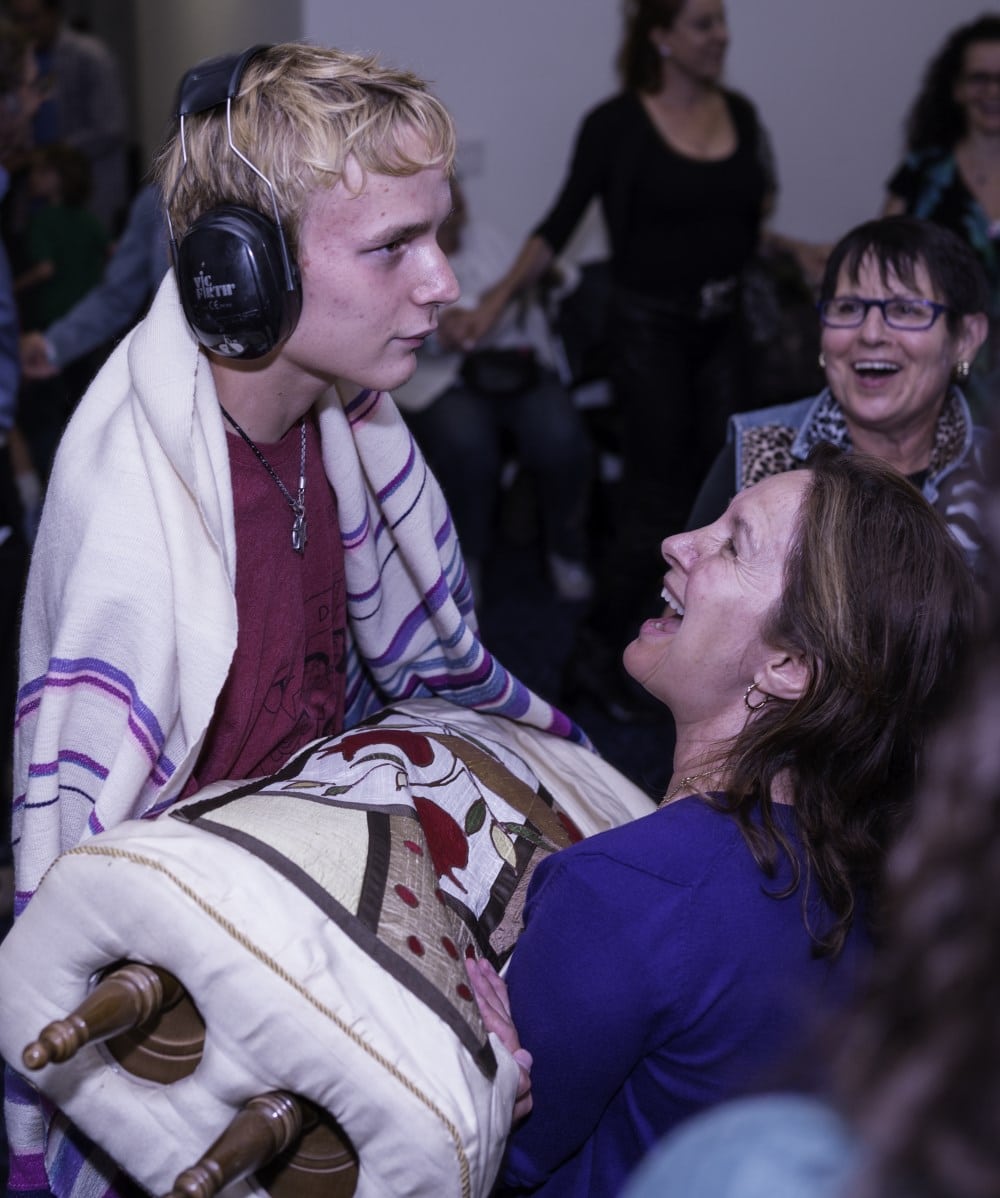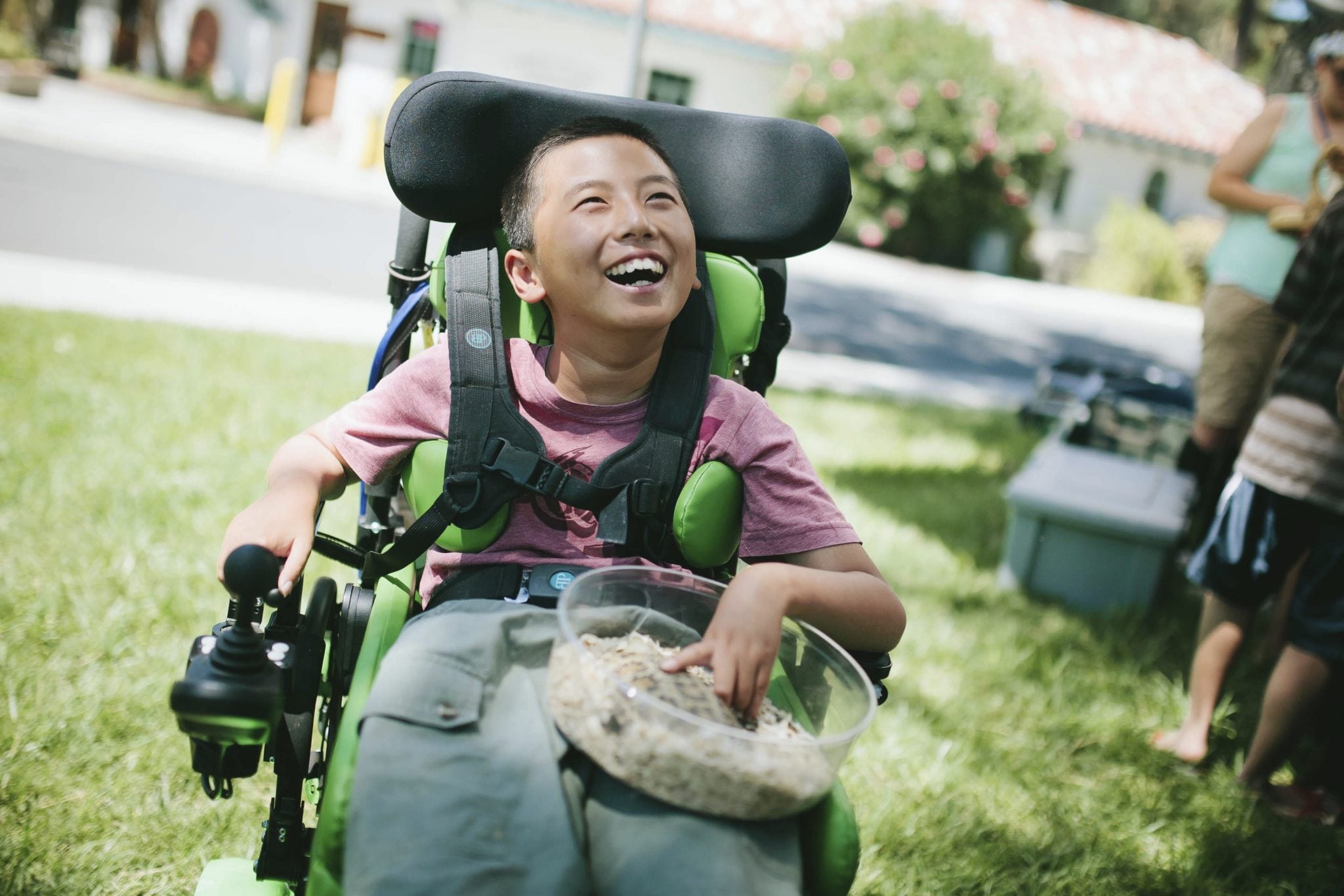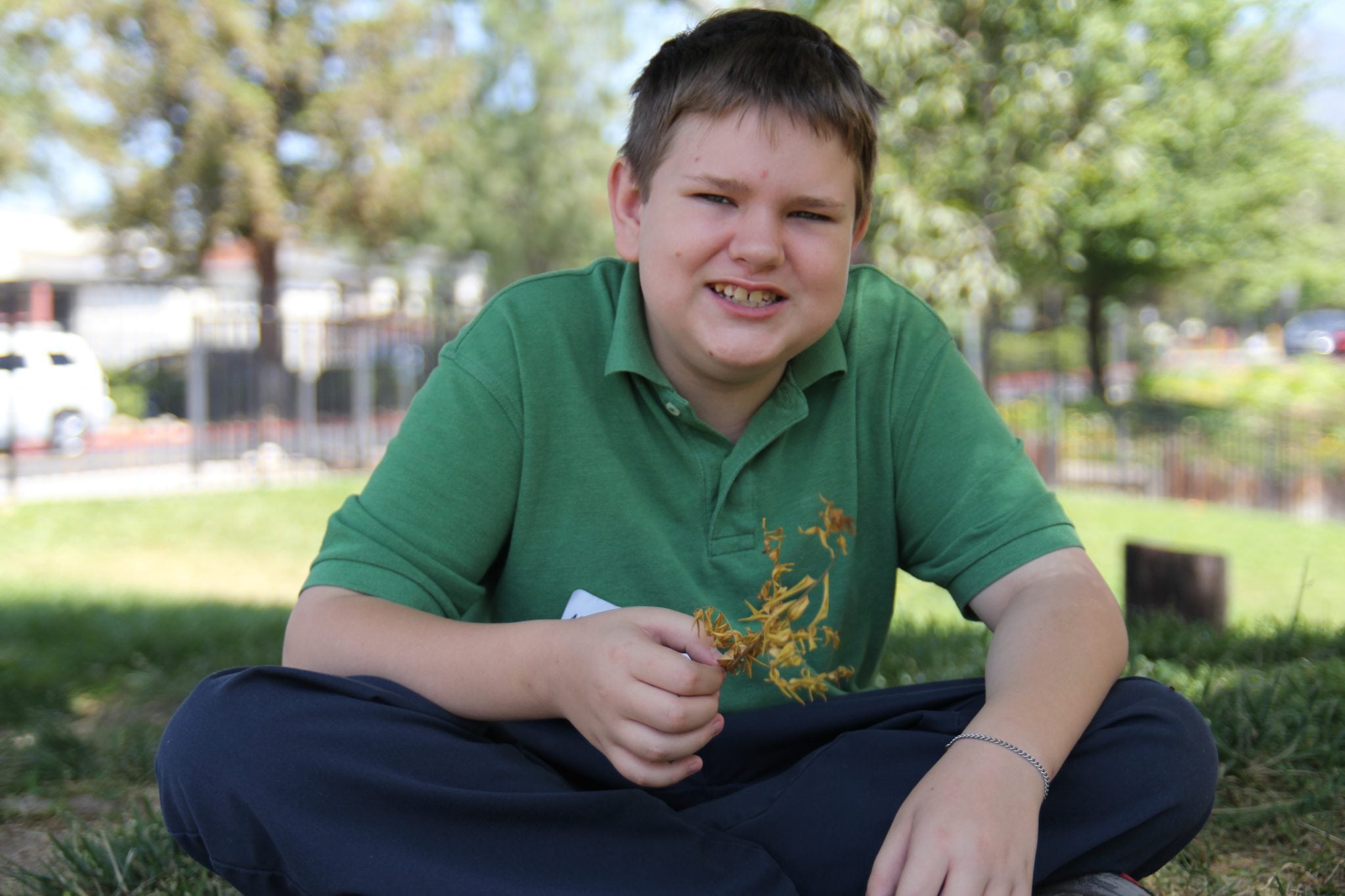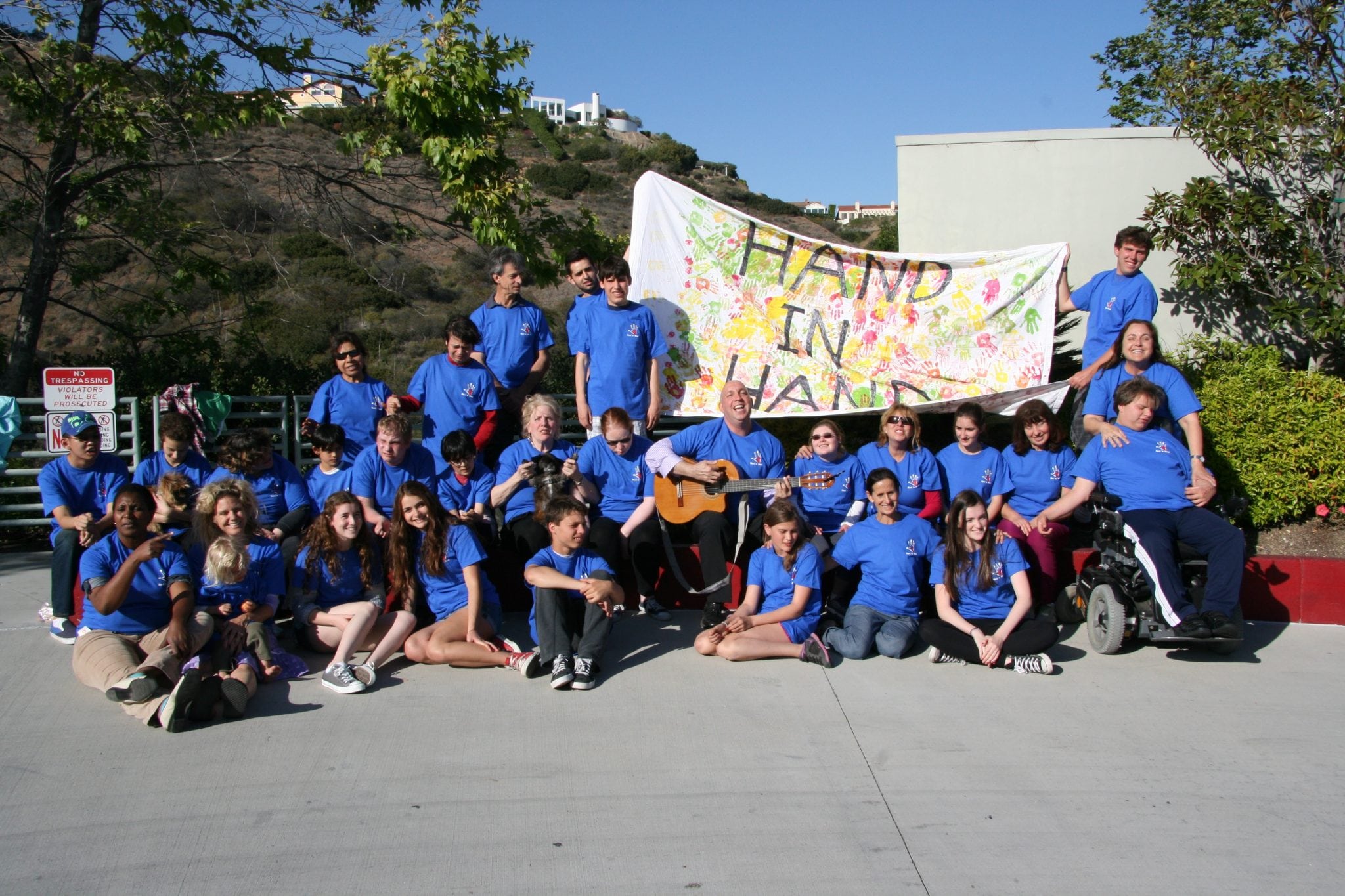
Neal Katz, who has autism, and his mother, Elaine Hall, are shown celebrating Simchat Torah with the Nashuva community. PHOTO BY SCOTT TANSEY
When my cousin Gloria asked whether my son, who has autism, was getting a religious education, I balked. “I just can’t think about that now – not with all of his therapies, his intense behavioral challenges, battling the school system, finding doctors, rallying Regional Center funding. It’s too much to add one more thing to my plate,” I told her. I didn’t realize that a spiritual community was exactly what we needed.
My cousin would not give up. She emailed me about the importance of building a spiritual community for my son and often suggested that I take him to synagogue. She sent me articles about kids with disabilities having Bar/Bat Mitzvahs. I thanked her for her caring, but knew that I wouldn’t follow through.
My son and I had our own spiritual connection. We were a community of two. We prayed each night, every morning and before and after meals. We expressed gratitude for the lives that we had, and we were compassionate towards others. I wondered, isn’t this enough? I reminded myself about the last time we went to synagogue, where the sights, sounds and rigid protocol totally overwhelmed my son and I wound up apologetically carrying my screeching, whirling 6-year-old out of the sanctuary.
That Was Then …
Today, our world is 180 degrees different. As founder and creative director of The Miracle Project – an inclusive theater, film and expressive arts program for individuals of all abilities – I was invited in 2007 to create an inclusive Bar/Bat Mitzvah program at Vista Del Mar, which provides services for families with special needs. That year, my son turned 12, which is when typically developing Jewish males would be preparing for their Bar Mitzvah “coming of age” celebrations.
Along with my team from The Miracle Project, I developed a multisensory, individualized religious education program for children and teens of all abilities, including non-verbal children such as my son. We added a flexible frame to the typical protocol of prayer and religious service. We personalized the blessings and made them meaningful for each student. We aligned the stories of the Bible with particular challenges shared by our students with disabilities. We named the program “Nes Gadol” (Great Miracle).
My son and I also began attending Koleinu (Hebrew for “hear our voices”), a twice-monthly program of Shabbat services at Temple Beth Am in West Hollywood. The program was founded by congregants who have children with special needs. Koleinu was held in a small classroom converted into a mini-sanctuary where kids with all sorts of developmental disabilities gathered with their families to sing, pray, discuss and build community.

Nikita Wang participates in the “In His Image” program at the First Church of the Nazarene in Pasadena, designed to provide an environment of acceptance and belonging for children, teens and adults with special needs. PHOTO COURTESY FIRST CHURCH OF THE NAZARENE PASADENA
I met some of my closest friends at that service, and that is where my son first became an active participant. In this safe, accepting environment, my son became accustomed to the prayers, the etiquette, and loved the communal spirituality. He took on a glow whenever he went to class.
When it came time for him to begin working on his Bar Mitzvah, I was concerned about whether he understood what we were asking of him. But when he typed with his non-Jewish speech therapist, “My Bar Mitzvah will be a great celebration. It is when I make a commitment to the Torah,” I knew he was ready. Being non-verbal, he danced his prayers and typed “God helps me find patience with my autism,” which was read to the congregation. There was not a dry eye in the house.
Spirituality For All
I have found that individuals with autism and other disabilities have the same spiritual needs and concerns as their neuro-typical siblings and peers. Often their spiritual connection is even at a higher level than in most kids their age.
And many religious traditions teach principles of inclusion, acceptance and caring for those who might be weaker or less fortunate. Common to all religious belief is that we are all created equal and in the image of God.
Yet too often, parents report that their places of worship are as difficult to navigate as school systems. They feel shut out from their religious communities. As their friends’ kids attend catechism, become members of the children’s choir and participate in youth-group activities, families with children who have disabilities become more and more isolated. Congregants know just what to do when a fellow congregant is ill or there is a death in the family. But when a family is diagnosed with a disability, often they don’t know how to respond.
Fortunately, more places of worship are working with inclusion experts to make their organizations more open to those with disabilities, and starting programs to address unmet needs.
A recent conference hosted by Calvary Community Church in Westlake Village brought together disability leaders, ministers, educators and practitioners from around the world to explore ways to practically and efficiently promote disability ministry in the Christian community. The Muslim community is reaching out to try to erase the stigma of disabilities, and encourage its members to embrace families with special needs. I recently led the Vista Inspire Community Inclusion Program, funded by the Los Angeles Jewish Community Foundation, to train five Los Angeles-based synagogues and Jewish centers to be more inclusive.

Kristina Cox, right, and Willa Giffin share a smile at the Hand in Hand Jewish Center after-school program. PHOTO COURTESY HAND IN HAND
Clergy, religious educators and parents who have children with disabilities have been creating programs of their own.
Nancy Alspaugh Jackson, mother of a son with autism, started the Exceptional Ministries, which meets every third Saturday at the Prince of Peace Episcopal Church in Woodland Hills and continues fellowship afterward with a buffet meal. At the First Church of the Nazarene in Pasadena, Pastor Julie Keith has spearheaded a program for children, teens and adults with disabilities and their families. It includes specialized Sunday School classes with individual and mainstreamed activities, after-school and summer activities and inclusive services.
Some programs exist within larger organizations, others are stand-alone, and some organizations simply have a culture of inclusion where people of all abilities naturally feel a sense of belonging.
All religious traditions teach us to love, to have compassion, and to embrace those who may experience the world differently from ourselves. So, to welcome a congregant with a disability may do more for the congregation than it does for the child with the disability. After attending my son’s Bar Mitzvah, Ruth Shuken, a radiant, smartly-dressed 98-year-old, said that it was the most spiritual service she had ever attended. Think about how many services she had attended! It may take a village to raise a child, but it takes a child with special needs to raise the consciousness of a village.
Faith-based Resources
Autism Speaks: www.autismspeaks.org/family-services/your-religious-community. This national organization offers a searchable online database for inclusive religious services.
Beth Jacob: 9030 W Olympic Blvd., Beverly Hills; 310-278-1911. This Modern Orthodox Jewish congregation’s leaders were recently certified in the Vista Inspire Community Inclusion Program. Beth Jacob strives to provide members of all generations and the broader Jewish community a spectrum of spiritual, educational, social, chesed, and cultural opportunities.
Congregation Or Ami: 26115 Mureau Rd., Calabasas; 818-880-4880; www.orami.org/community/special-needs. Offers individualized Bar and Bat Mitzvah training for children with special needs, support groups for parents of children with special needs, large-print prayer books and an Education Intern who acts a liaison for special-needs families.
Exceptional Families Ministries: Prince of Peace Episcopal Church, 5700 Rudnick Ave., Woodland Hills; 818-346-6968; Nancy Alspaugh Jackson, Nancy@act-today.org. 5 p.m. every third Saturday. Parents, grandparents, caregivers, children and adults with special needs, and the general public can participate in a family worship service with contemporary music and sharing, followed by a family buffet meal (gluten-free/dairy-free options).

Michael Stadler participates in the “In His Image” program at the First Church of the Nazarene in Pasadena, designed to provide an environment of acceptance and belonging for children, teens and adults with special needs.PHOTO COURTESY FIRST CHURCH OF THE NAZARENE PASADENA
First Church of the Nazarene Pasadena: 3700 E. Sierra Madre Blvd., Pasadena; Pastor Julie Keith, jkeith@paznaz.org, 626-351-2485. The In His Image program is designed to provide an environment of acceptance and belonging for children, teens and adults with special needs and their families.
Friends of Angels Sunday Program: Journey South Bay Church, 2761 190th St., Redondo Beach; www.journeysouthbay.org; Monica Gonderman, mgonderman@journeysouthbay.org. This 9:30 a.m. class for children with autism is staffed by professionals and trained volunteers, making it possible for their parents to attend the worship service.
The Friendship Circle: Locations in the San Fernando Valley, Conejo Valley, Los Angeles, Pacific Palisades and South Bay; www.friendshipcircle.com. Brings together teenage volunteers and children with special needs for hours of fun and friendship. The Palisades group includes a spiritual support group for parents of children with special needs.
Ha Mercaz: www.hamercaz.org. Ha Mercaz is a central resource for Los Angeles Jewish families who have a child with special needs. It was founded by Michelle Wolf and Sally Weber, and is led by Sarah Blitzstein. Contact Amy Bryman at hamercaz@jfsla.org.
Hand in Hand: Malibu Jewish Center, 24855 Pacific Coast Highway, Malibu; www.mjcs.org; 310-456-2178. This after-school social program integrates youth of all abilities, and accepts all children regardless of religious affiliation.
ICAN: Hope Chapel, 2420 Pacific Coast Highway, Hermosa Beach; www.hopechapel.org. This nonprofit works with local churches to serve persons with disabilities, running outreach and service programs, Sundsy School and day trips to local attractions.
IKAR LA: 5870 W Olympic Blvd., L.A.; www.ikar-la.org; 323-634-1870. IKAR is a leading-edge Jewish community in Los Angeles that seeks to inspire people across the religious spectrum.
Inclusion from WithIn (I WIn): Elaine Hall coachelainehall@gmail.com offers consultations and trainings in how to help faith-based organizations be more inclusive.
Koleinu Temple Beth Am: 1039 S. La Cienega Blvd., L.A.; Reut Skylar, rsklar@tbala.org, 310-652-7354, ext. 212. This twice-monthly Shabbat service welcomes participants ages 9 and up at any level of ability.
Love My Provider: www.lovemyprovider.com. Click on “Religious Services” and enter a ZIP code. Love My Provider will show religious services that are inclusive within a certain mile radius.
Jews and Special Needs Blog: www.jewishjournal.com/jews_and_special_needs. Michelle Wolf writes a weekly special needs blog for the Jewish Journal chronicling events and activities through the experiences of her son, Danny, who has cerebral palsy.

The after-school program at Hand in Hand Jewish Center integrates youth of all abilities, regardless of religious affiliation. PHOTO COURTESY HAND IN HAND
The Miracle Project: www.themiracleproject.org; elaine@themiracleproject.org. This program offers spiritual, uplifting support groups for parents, and a compassionate, supportive community for individuals of all abilities. Students from The Miracle Project perform and speak (some non-verbal using iPads to communicate) at congregations throughout Los Angeles to foster awareness, appreciation and inclusion.
Nashuva: Brentwood Presbyterian Church, 12000 W. San Vicente Blvd., L.A.; www.nashuva.org. Rabbi Naomi Levy and her congregation include all abilities in their spiritual, uplifting services and monthly social action activities.
Nes Gadol: Vista Del Mar, 3200 Motor Ave., L.A.; www.vistadelmar.org/nesgadol; Rabbi Jackie Rediner, 310-836-1223 ext. 209. This multisensory Jewish education program is individualized for children and teens with autism and other developmental disabilities.
OurSpace: Locations in Encino and Woodland Hills; www.ourspacela.org. OurSpace offers children, teens and adults with special needs opportunities for life-long Jewish learning, celebrating Shabbat, holidays, life cycle events, and participating in “tikkun olam” (repairing our world).
Sacraments 123: Available on iTunes. This app, the first of a series of fun apps geared for children, parents, teachers and those with special needs, was created to teach the sacraments using a series of matching games.
University Synagogue: 11960 Sunset Blvd., L.A.; unisyn.org; 310-472-1255. This warm and welcoming Reform Jewish community successfully completed the Vista Inspire Community Inclusion certification program.
Young Life Capernaum: Multiple locations, www.younglife.org. Area Director Dave Avramovich, avramovich@greaterpasadena.younglife.org. Young Life Capernaum provides Christian fun, adventure, acceptance and socialization for teens with special needs alongside volunteer leaders and peer buddies.
Elaine Hall is an inclusion activist and founder of The Miracle Project Theater Program and consults with faith-based organizations across the U.S. on how to be more inclusive. She was profiled in the HBO film, “AUTISM: The Musical,” is the author of “Now I See the Moon” and co-author of “Seven Keys to Unlock Autism: Making Miracles in the Classroom.” Contact Elaine at coachelainehall@gmail.com




























